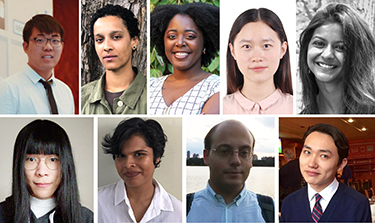 Each student’s combination aims to help them to find new ways to study and view the world. Similar in concept to the Open Curriculum for undergraduates, Open Graduate Education allows doctoral students to complete a master’s degree in a secondary different field.
Each student’s combination aims to help them to find new ways to study and view the world. Similar in concept to the Open Curriculum for undergraduates, Open Graduate Education allows doctoral students to complete a master’s degree in a secondary different field.
“The program allows me to simultaneously ground myself in two disciplines, thereby gaining a sharper insight into the ways in which they depart and draw from one another,” says PhD student Ahona Palchoudhuri.
Congratulations to the ten selected students (pictured left to right, top to bottom):
- Tong Cai, a doctoral student in Chemistry is seeks a master’s degree in the Program in Innovation Management and Entrepreneurship
- Christopher Cox, a doctoral student in Egyptology and Assyriology, enters a master’s program in Africana Studies
- Sarah Davenport, a doctoral student in Anthropology, is pursuing a master’s in Africana Studies
- Kiara Lee, a doctoral student in Biomedical Engineering, will study Global Public Health
- Lingyu Ma, a doctoral student in Chemistry, is entering a master’s program in Computer Science
- Ahona Palchoudhuri, doctoral student in Anthropology, seeks a master’s in Musicology and Ethnomusicology
- Dawei Si, a doctoral student in Chemistry, will study Computer Science
- Pamudu Tennakoon, a doctoral student in the History of Art and Architecture, enters a master’s program in Anthropology
- Marko Vitas, a doctoral student in Classics, is pursuing a master’s in Egyptology and Assyriology
- Albert Webson, doctoral student in Computer Science, seeks a master’s in Philosophy
As an undergraduate, Albert Webson studied political philosophy with the intention of applying to a PhD program in the same field, only switching to computer science at the last minute.
His lasting interests in ethics and democratic theories drew him to the philosophy department at Brown, which is known for metaphysics and philosophy of mind. These concepts naturally connect to Webson’s interest in artificial intelligence and natural language processing (NLP).
As a result, he was eager to apply for the Open Graduate program, knowing it would be the perfect opportunity to for him to meld his scholarly interests.
His goal, as an NLP researcher, is to develop general-purpose representations of human languages. His current focus is on connecting and grounding computational models of languages onto the real world, particularly social-political contexts.
“Ideally, after graduation, I will seek a joint faculty appointment between a department of computer science and a department of philosophy that will enable me to continue to research and teach in the intersection of artificial intelligence, political science, and philosophy,” says Webson.
Another member of the new cohort, Ahona Palchoudhuri is combining music and anthropology. She examines the relationship between Indian classical music and seasonal labor in rural India through ethnographic research in communities of paddy-cultivators, potters, and musicians in Bankura, West Bengal. Palchoudhuri considers how Malhar, a monsoonal form of Indian classical music, plays an integral part in the everyday life of the region.
Having a secondary master’s in music will allow Palchoudhuri to apply for teaching positions across departments. The courses she imagines teaching will benefit from an understanding of the ways in which theoretical frameworks across anthropology and music come to be both shared and reconstrued.
“I imagine my scholarly life as involving not just teaching, but also developing and conceptualizing lecture-demonstrations or pedagogic performances that have historically been at the heart of the Indian classical music tradition. Being well-versed in the theoretical conceptions from the “western” canon will allow me to design my lecture-demonstrations more innovatively, and address them to a wider audience” says Palchoudhuri.
Also mixing the social sciences and humanities, Pamudu Tennakoon combines the History of Art and Architecture with Anthropology and hopes to pursue a comparative study examining public colonial architecture in present-day postcolonial countries. She is interested in exploring Chennai (India), Colombo (Sri Lanka), and Singapore. “These cities provide varied colonial, postcolonial, and contemporary journeys allowing for a rich comparison of diverse relationships to colonial architecture and histories,” says Tennakoon.
The Open Graduate program will allow her to make broader comparisons—between the urban and the rural, different postcolonial countries, and different contemporary and historical approaches to colonial architecture.
“I find this program to be very important for those graduate students, like myself, who are interested in pushing the boundaries of disciplines, as it will allow us to begin with a strong foundation in more than one field,” says Tennakoon.
Lingyu Ma is working in the physical sciences, combining Chemistry and Computer Science. Her doctoral research is focused on pairing physical theories with experimental data to reveal physical observables and phenomena, which requires heavy usage of quantum chemistry packages and molecular dynamic simulations.
Ma emphasizes that her computer science courses will benefit her doctoral research. “The knowledge and skills gained from these courses can not only provide me with new ideas, but also give me powerful tools to solve scientific problems I meet,” says Ma.
As a second-year PhD student in Chemistry, Dawei Si is currently working on understanding the theoretical chemistry behind intrinsically disordered proteins. He studies the systems microscopically by computational simulations.
For his master’s in Computer Science he will examine the same topic with a different approach. His research will use big data to successfully predict structure contents.
“Being selected for the Open Graduate Education program makes it possible for me to enrich my knowledge from both perspectives,” says Si.